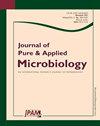自身免疫性疾病的肠道微生物特征差异
IF 0.6
Q4 MICROBIOLOGY
引用次数: 0
摘要
由于可以进行高通量测序,人类肠道微生物群已得到广泛研究。正常菌群和共生微生物菌群在人类体内各具特色,其中细菌占微生物成分的绝大部分。这些微生物遍布人体各个部位,包括口腔、阴道、皮肤和胃部。微生物的种类和数量在同一个人的不同器官中各不相同,但在不同人之间也可能存在差异。它们对人体健康非常重要,还会通过改变新陈代谢和行为来影响免疫系统。营养不良、克罗恩病、炎症性肠病和结肠炎等疾病,以及 II 型糖尿病和肥胖等代谢性疾病,都与肠道微生物群有关。近年来的一些研究强调了共生菌与包括自身免疫性疾病在内的多种疾病的相关性和参与性。自身免疫性疾病,如巴塞杜氏病、系统性红斑狼疮(SLE)和肠易激综合征(IBS),通常以自身耐受性丧失而闻名,这是一种针对人体自身组织的过度反应。自身免疫性疾病是由针对自身组织的免疫系统引发的,其全球发病率估计在 3% 到 5% 之间。这篇综述再次证实了自身免疫性疾病与肠道细菌之间的联系。确切的病理生理学尚不清楚,但环境因素(如生活方式、饮食、药物和感染)和特定的遗传条件是可以预见的。肠道微生物群在自身免疫中非常重要,因为微生物组成的变化会引发免疫耐受丧失。本文章由计算机程序翻译,如有差异,请以英文原文为准。
Gut Microbial Profile Differences in Autoimmune Diseases
The human gut microbiota has been widely studied due to the possibility of high-throughput sequencing. Humans are distinctly inhabited by normal flora and symbiotic microbial flora, with bacteria accounting for the vast bulk of the component microorganisms. These organisms can be found in a variety of locations throughout the body, including the oral cavity, vagina, skin and stomach. Microbe types and abundance vary in different organs of the same person, but they may also differ between persons. They are very important for human health and also affect the immune system by altering its metabolism and behavior. Conditions such as malnutrition, Crohn’s disease, inflammatory bowel disease and colon colitis, in addition to metabolic disorders including type II diabetes and obesity, have all been associated with the gut microbiota. Several studies in recent years have emphasized the relevance and involvement of commensal bacteria in the development of a variety of disorders, including autoimmune diseases. Autoimmune diseases, Such as Graves’ disease, systemic erythematosus lupus (SLE), and irritable bowel syndrome (IBS), are commonly known for their loss of self-tolerance, a hyperactive reaction against the body’s own tissue. Autoimmune diseases are triggered by the immune system targeting self-tissues, and their global frequency is estimated to be between 3 and 5%. This review reaffirms the links between autoimmune disorders and gut bacteria. The precise pathophysiology is unknown; however, environmental factors (such as lifestyle, diet, medications, and infections) and specific genetic conditions have been expected. The gut microbiota is important in autoimmunity because changes in microbial composition can trigger immunological tolerance loss.
求助全文
通过发布文献求助,成功后即可免费获取论文全文。
去求助
来源期刊

Journal of Pure and Applied Microbiology
BIOTECHNOLOGY & APPLIED MICROBIOLOGY-MICROBIOLOGY
CiteScore
2.00
自引率
0.00%
发文量
266
审稿时长
11 months
期刊介绍:
Journal of Pure and Applied Microbiology (JPAM) is a peer-reviewed, open access international journal of microbiology aims to advance and disseminate research among scientists, academics, clinicians and microbiologists around the world. JPAM publishes high-quality research in all aspects of microbiology in both online and print form on quarterly basis.
 求助内容:
求助内容: 应助结果提醒方式:
应助结果提醒方式:


